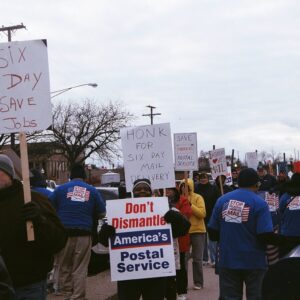March 1, 2016
990s Are Due!
(This article first appeared in the March-April 2016 issue of The American Postal Worker magazine.)
For unions, filing IRS form 990 annually is not optional! failure to submit this report could result in significant monetary penalties and revocation of our tax-exempt status.
This is true for locals and state organizations as well as the national union: As tax exempt 501(c)(5) organizations, we must file Form 990, Return of Organization Exempt from Income Tax.
Retiree chapters that receive and manage the retiree dues rebates they receive from the national union must file Form 990-N. (Retiree chapters that have their dues rebate deposited with the local union do not have to file the form.)
Form 990 requires unions to report on their tax-exempt and other activities, their finances, governance, compliance with certain federal tax filings and requirements, and the compensation paid to certain people.
Tax Exempt
|
Annual Dues Collected |
Must file |
Penalty for Late Filing |
Extension to File |
|---|---|---|---|
|
$0-$50,000 |
990-N Electronic Postcard |
Tax-exempt status revoked after 3 consecutive years of failing to file 990-N |
No |
|
$50,001-$199,999 |
990 EZ |
$20 per day, not to exceed the lesser of $10,000 or 5% of the gross receipts of the organization for the year |
Yes, Form 8868 (3 months) |
|
$200,000 or greater |
990 |
Annual gross receipts exceeding $1 million are subject to a penalty of $100 for each day (maximum penalty $50,000) |
Yes, Form 8868 (3 months) |
Section 501(c)(5) of the IRS code exempts labor organizations from paying federal income taxes on the dues they collect from their members. This is because unions don’t operate for profit; they provide valuable services to the community via representation and advocacy for workers – in our case postal workers.
To qualify for tax-exempt status, unions must satisfy the following IRS requirements:
- The net earnings of the organization may not be used to the benefit of any member.
- The object of the organization must be the betterment of conditions of those engaged in the pursuits of labor.
To retain our tax-exempt status, labor organizations must maintain accurate financial records and submit required IRS forms.
If, for some reason, a local, state organization or retiree chapter loses its tax exempt status, the IRS will treat it as a corporation. In that case, taxes could be assessed for all the dues collected from the organization’s members, along with additional penalties for failing to file the required form.
In addition, the local, state organization or retiree chapter would be required to file federal income tax returns (Form 1120, U.S. Corporation Income Tax Return).
Locals, States, Retiree Chapters Filing Requirements
The 990 forms must be filed by the fifth month and 15th day after the end of the union’s or chapter’s fiscal year. (A fiscal year, also known as a financial year or budget year, is the period used for calculating yearly financial statements in businesses and other organizations.) For example, if the fiscal year of the union or chapter is the calendar year Jan. 1, 2015, to Dec. 31, 2015, the report must be filed by May 15, 2016.
To maintain their tax-exempt status, locals and state unions in the $50,000 or less category must file Form 990-N even if they have not received any dues from members. This requirement is based upon the IRS’ need to have current contact information on tax-exempt organizations.
Local or state officers who have questions about how to complete Form 990 should contact Roosevelt Stewart in the Secretary-Treasurer’s Department.
| Local, State Unions Must File Annual LM Report |
|---|
|
All APWU locals and state unions that receive dues rebates (DCO checks) from the national union must file an annual financial report with the Department of Labor (DOL). This report is mandatory. The LM report must be submitted 90 days after the end of the fiscal year. If the union’s fiscal year ended on Dec. 31, 2015, the report must be filed with the DOL by March 30, 2016. Which form a local or state must file depends on its annual revenue. – LM-4: Annual dues receipts less than $10,000 – LM-3: Annual dues receipts $10,000 to $249,999 – LM-2: Annual dues receipts $250,000 or more The Secretary-Treasurer’s Department has scheduled webinars to assist local officers. Please check the webinar schedule on the Secretary-Treasurer’s page at www.apwu.org/departments-divisions/secretary-treasurer. |



